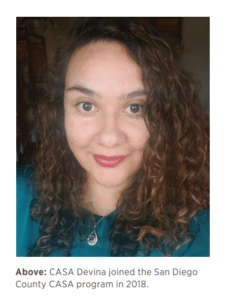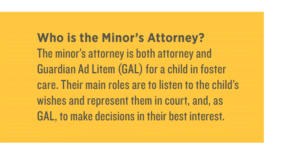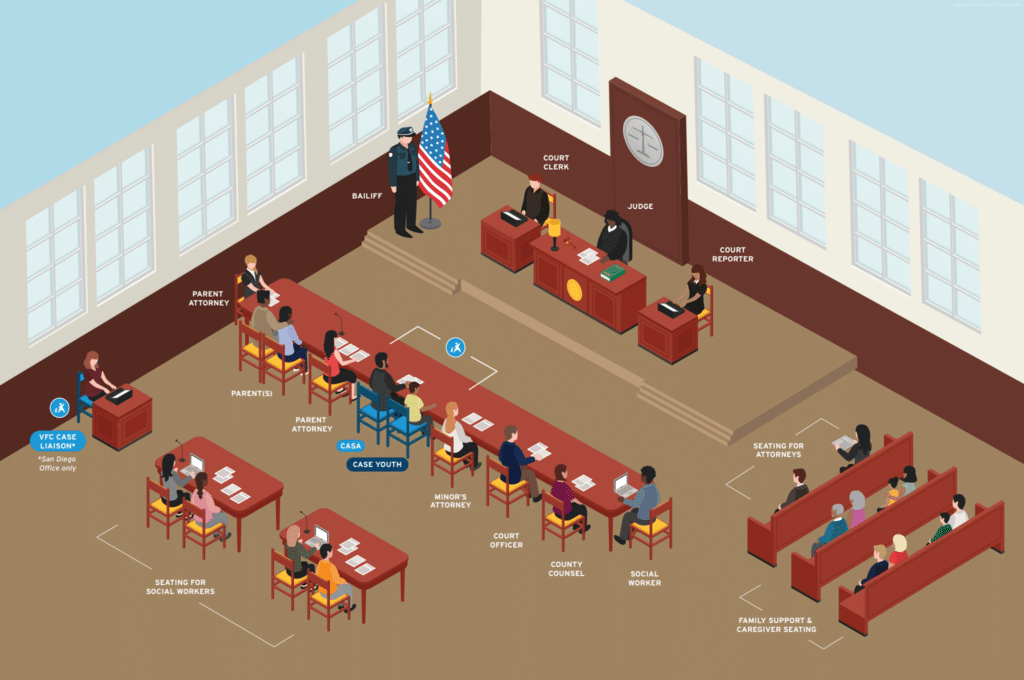CASAs in Court
How volunteers put advocacy into action
When Court Appointed Special Advocate (CASA) Devina Pacheco was assigned to 13-year-old “Juliana’s” case, her mother’s parental rights had already been terminated. But as CASA Devina got to know Juliana and her mother, “Miranda,” she saw just how hard Miranda was working toward stability. She attended every child and family team (CFT) and individualized education program (IEP) meeting, actively participated in family therapy, and always returned CASA Devina’s phone calls. As time went on, it was clear to CASA Devina that Juliana would do best back home with her mom.
 “Her mother was showing up every weekend, and Juliana was always really happy when she saw her,” CASA Devina said.
“Her mother was showing up every weekend, and Juliana was always really happy when she saw her,” CASA Devina said.
With Juliana’s blessing and support from Voices for Children (VFC), CASA Devina started advocating for reunification services to resume. Everyone knew this would be a tough battle; parental rights aren’t usually reinstated after being terminated once. Still, CASA Devina worked closely with the minor’s attorney to make it happen.
At a recent court hearing, the judge reviewed their request and ruled there was enough evidence to move forward! Had CASA Devina not fiercely advocated for what she felt was in Juliana’s best interest, this
family may not be on the path to reunifying.
“I felt really happy that they got a second chance,” CASA Devina said.
PREPARING TO ADVOCATE
This is just one example of how CASA volunteers help dependency court judges make decisions about the futures of children in foster care. However, most CASAs come to VFC with no legal experience. How do they prepare for the important and often daunting task of going before a judge? It all starts with Advocate University (AU), a 35-hour intensive training course for all new volunteers. During AU, volunteers watch simulations of court proceedings to understand the legal process and hear from long-time CASAs about their experiences. They also learn how to write court reports, which cover a child’s history, current situation, and any unmet needs.
 CASAs typically write court reports every six months, which coincide with status review and permanency planning hearings required for all youth in foster care. (Youth may also have additional or special hearings in between.) Judges receive generalized reports from social workers and lawyers, but a CASA’s court report is what brings the child’s personality to life.
CASAs typically write court reports every six months, which coincide with status review and permanency planning hearings required for all youth in foster care. (Youth may also have additional or special hearings in between.) Judges receive generalized reports from social workers and lawyers, but a CASA’s court report is what brings the child’s personality to life.
“Because CASAs usually serve only one child or sibling group at a time, they develop a special rapport with the children. As a result, their court reports often detail needs or concerns the child may have that they haven’t shared with anyone else,” explained Jessica Muñoz, Esq., MFS, VFC Executive Vice President & Executive Director, Riverside County.
INSIDE THE COURTHOUSE
Each CASA works with their advocacy supervisor, a program staff member at VFC, to prepare for court appearances. An advocacy supervisor accompanies the CASA to court if it’s their first time or if there are special concerns on a case.
“Once at the courthouse, I will introduce the CASA to the attorneys on the case since, often times, they have only interacted on the phone or over email,” said Amanda Reynolds, Senior Advocacy Supervisor at VFC, who supports CASA Devina. “This way, they can discuss any remaining questions or concerns in-person.”
While waiting for the hearing to begin, the advocacy supervisor prepares the CASA for what’s about to happen. They explain where to sit, how to address the judge, who the judge might call on, and what the judge might ask. Afterward, the CASA and advocacy supervisor will discuss the judge’s ruling and any next steps.
HERE TO SUPPORT YOUTH
Appearing in court is an essential part of the CASA role. As illustrated in the diagram, the CASA sits right next to the child, providing comfort, support, and encouragement.
“The courtroom can be an intimidating place, even for youth who may have been to court many times,” Muñoz said. “CASAs encourage youth to advocate for themselves and to be candid with the judge about their needs and wishes for their case.”
“CASAs can also let the court know if the child’s circumstances have changed since the court report was submitted,” she added.
From standing by a child’s side as they face their alleged abuser to sharing in the joy of a family reunification or adoption, CASAs play a crucial role in the courtroom.


 Fostering Hope: Advocating for Children in Foster Care with Disabilities
Fostering Hope: Advocating for Children in Foster Care with Disabilities